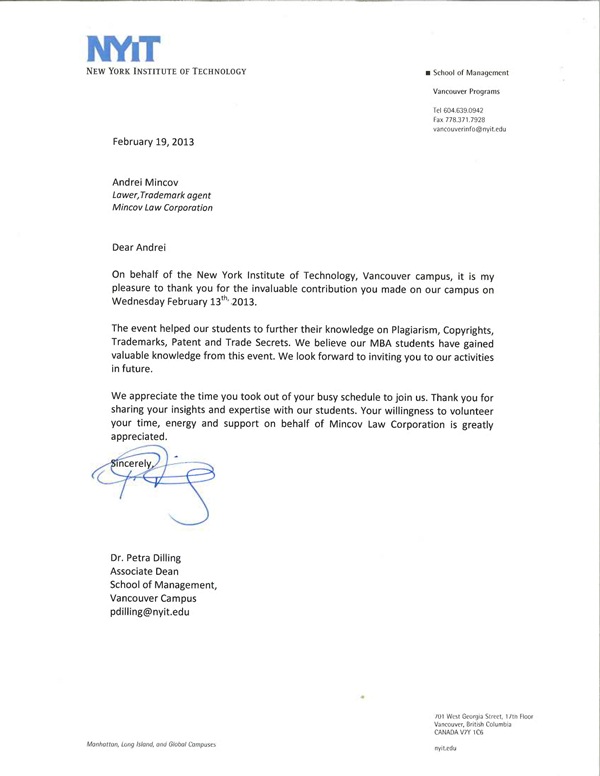Blog
Business owners who want to protect their branding need to know that there are four important elements in any trademark application.
This is important regardless of whether they use the Trademark Factory™ to register their trademarks, whether they file themselves or whether they use a different trademark agent or a lawyer (why would they?).
These four elements are: trademark owner, trademark, goods / services, and dates.
The first one is straightforward: a registered trademark must be owned by an entity, a partnership or an individual. The public and Canadian Intellectual Property Office need to know who it is. If during the registration process, the trademark changes hands, you can always assign the pending trademark application to a new owner.
A trademark application may only cover one single trademark. If you have several trademarks, each will require a separate application. While there is often a temptation to combine several trademarks into one application to cut the cost of registration, it’s really not a good idea, especially if you use thus combined trademarks separately. This is because in Canada any trademark that has not been used as registered for 3 years or more, can be cancelled on request of any third party. So if you lump a logo and a tagline into a single trademark registration, and then your tagline changes, you may lose rights in both the old tagline and the logo. This is because the registration protects your rights to the entire trademark and not to its elements.
Importantly, trademarks (whether registered or not) don’t give their owners a monopoly over the name or the logo itself. They only give a monopoly over their association with specific products and services for which the name or logo are used. For example, BLUE SHIELD trademark is owned in Canada by two completely different entities: one in association with prepaid financing and administration of medical services, and the other in association with various items related to welding. This is why the trademark application requires the applicant to specify in association with which products (wares) and services they use or are planning to use the trademark. Canadian Intellectual Property Office is very pedantic about the way the list of these products and services is drafted. If an examiner believes that a term in that list is not specific enough, they will issue an office action requiring that the application be amended. I will provide several tips about drafting the list of goods and services in my next post.
Finally, the dates. In Canada, one can only get a trademark registration if the trademark is being used in association with each and every one of the goods and services listed in the application. It is possible to apply for a registration before the use starts (it’s called “proposed use”), but the registration certificate will not be issued until the business owner files what’s called a declaration of use. A simple rule of thumb is: only list those products and services that you are currently using the trademark for and those that you believe you may start using it for in the next 2-3 years. If you have already been using the trademark at the time when you file the application, it is important to specify the earliest date that you can prove with evidence that you were using the trademark for.
The trademarking process used to be full of frustrations and complications for business owners. That is until the Trademark Factory™ was launched with its unique triple Peace-of-Mind guarantee. We guarantee that you will know your budget to a penny before you spend a dime; we guarantee that your trademark will be approved by the Canadian Intellectual Property Office – or you get all of your money back, including what you pay to the government; and we guarantee that you will not be frustrated with not being able to get a hold of your lawyer. This service is really the natural choice of business owners who value their branding and want to protect it in Canada.
I have just added a new template for one-way Non-Disclosure Agreements (NDA) to the Intellectual Property Agreements / Templates page.
There are many free templates of NDAs that one can easily find on the web. Why would I offer mine as a paid download?
The free forms are usually overly simplistic and don’t cover half the issues that need to be covered.
Often, however, when I am asked to draft one to fit a particular client’s circumstances, the cost of the NDA can become too steep for a small business client.
Continuing the trend I started with the copyright agreements, this NDA is designed to help businesses bridge the gap between having a poorly written or no agreement at all and having to spend a fortune on a customized one.
As always, you can check out the preview and see for yourself that this template has more bases covered than any other free non-disclosure agreement template you can find on the web.
I hope this helps.
On April 18, 2013, I will deliver a free 2.5-hour workshop on intellectual property in plain English for business owners.
This workshop is organized by DigiBC, the Digital Media and Wireless Association of British Columbia.
As an attendee, you will walk away not only with a ton of useful information about what different areas of intellectual property can do to and for your business, but also with several tangible tools that will allow you to start building the IP strategy for your business.
If you are running a business and don’t have a clear and viable IP strategy, this is a workshop that you can’t afford to miss!
To attend, you must register at http://mincovlaw2013.eventbrite.com/.
| Categories: | Intellectual Property: | Intellectual PropertyIP Strategy |
| Values: | Passion | |
| Additional Tags: | Small Business | |
On February 13, 2013, I delivered a seminar on intellectual property at the New York Institute of Technology in Vancouver.
Great to see so many aspiring students with lit-up eyes who came to learn about IP.


I have recently attended a great seminar on business licensing.
Indeed, licensing can be a great way to grow a business and widen one’s streams of passive income.
Licensing has an obvious advantage over franchising in that it imposes substantially less mandatory requirements over the licensor.
It may appear that licensing is some kind of franchising-lite.
Whether or not it is so, it is very important to keep one thing in mind.
By definition, a license is a permission to do something that no one would have the right to do without such permission. A license is not a right, it’s a permission.
The corollary from this definition is that for there to be a valid license, the license should cover something that you can legally stop others from doing. Just like it would be very difficult to enforce a license that allows someone to breathe in exchange for a 10% royalty, it would be difficult to enforce a license pursuant to which a business is licensing something that is readily available to the public without any restrictions.
Aside from properly documenting your intellectual property in the form of copyright, trademarks and patents, you should also take great care in keeping your secrets secret. If you fail to secure your confidential information, you may one day find yourself in a courtroom with a judge who would have little sympathy to your attempts to force a competitor pay you for something that you neglected to protect. Unless your IP is properly protected, you cannot license it out. Let me rephrase that. You may be able to license it out, but it would be difficult for you to enforce the terms of such license.
Intellectual property is an important (and sometimes, the most important) asset of your business. Whether or not your strategy involves licensing your business systems to others, you should always keep in mind that your actions have consequences.
If building business assets is a part of your strategy (and it should be), then having a meaningful IP strategy is a must!
| Categories: | Intellectual Property: | Intellectual Property |
| Additional Tags: | Small Business | |
Categories:
Intellectual Property:Trademarks
Intellectual Property
Copyright
IP Strategy
TMF Cartoons
New Article
Patents
Domain Names
Internet
Values:
Passion
Integrity
Innovation
Decency
Efficiency
Freedom
Individual Rights
Website Updates:
Website Updates
More Cases Uploaded
New Feature
Tags:
CollectivismPhilosophySmall BusinessNew Copyright ActFair DealingArchive:
March 2016October 2015
September 2015
July 2015
March 2015
August 2015
June 2015
May 2015
April 2015
February 2015
January 2015
December 2014
November 2014
October 2014
August 2014
May 2014
April 2014
March 2014
February 2014
December 2013
November 2013
October 2013
September 2013
August 2013
July 2013
June 2013
May 2013
April 2013
March 2013
February 2013
January 2013
December 2012
November 2012
October 2012
September 2012
August 2012
July 2012
June 2012
May 2012
April 2012
March 2012
February 2012
January 2012
December 2011
